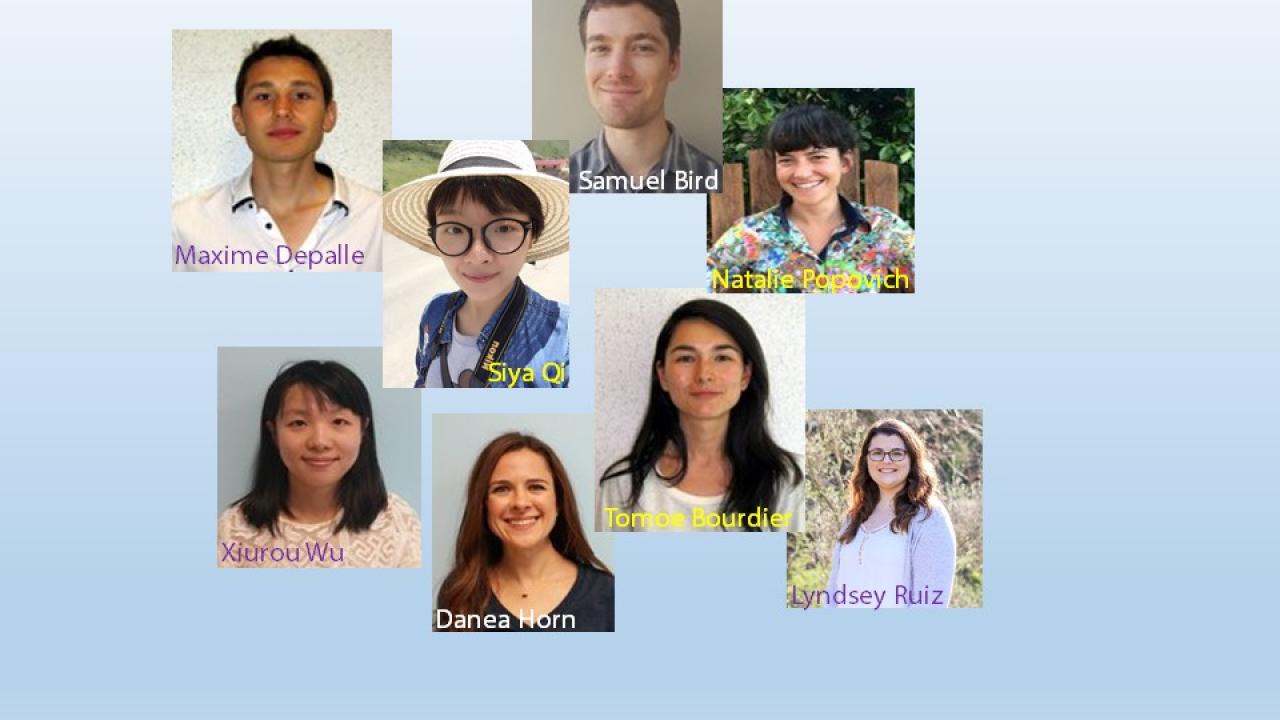
2018-19 Social Science Graduate Student Awards
2018-19 Social Science Graduate Student Awards
Every year, the UC Davis Institute for Social Sciences, in partnership with the CRC, awards several research and travel grants to social science graduate students in the College of Agricultural and Environmental Sciences. For fiscal year 2018-19, here is a list of the awardees and the projects they are working on.
Samuel Bird
Samuel Bird's job market paper studies how development programs target households when promoting adoption of new agricultural technologies. His research award will support him participating in the 2018 Agricultural & Applied Economics Association's annual meeting, where he will discuss his research with fellow researchers and prospective employers.
Tomoe Bourdier
Tomoe Bourdier is investigating the effect of polygyny on children’s nutrition outcomes, and how it may be mediated through women’s bargaining power. Polygyny (i.e., the marriage of a man to several women) is practiced in many countries of Africa South of the Sahara, and yet the factors that may aggravate or mitigate the impacts of economic shocks on the members of polygynous households are still poorly understood. Studying intra-household decision-making dynamics in non-nuclear households, and the role of women’s empowerment in particular, may help develop more adequate targeting strategies to maximize the impact of resilience-building and empowerment programs, and constitutes a important step in improving both children’s and women’s outcomes in areas where polygyny is common.
Maxime Depalle
This project examines the complex relationship between the spatial and temporal inconsistency of data availability and the impact of the choice of the spatial scale used in a discrete choice model (DCM) of fishing locations. It takes an original empirical approach relying both on simulated and real data, and consisting of estimating the same DCM at varying spatial resolutions.
Danea Horn
Danea Horn's project is an assessment of how patients value quality and technology when choosing a hospital. She will additionally be looking at changes in hospital quality when new technologies are adopted, and is working with Amitabh Chandra (Harvard) and Adam Sacarny (Colombia). She will be traveling back east to move the project forward.
Natalie Popovich
In the paper Natalie Popovich will be presenting, Using a Case Study of Residential Water Use, she proposes a framework to estimate the quality of information embedded in a specific policy instrument as a function of its duration in the system, as measured by the observable impact on resource use over time. She estimates the quality of information as a function of how long the household’s knowledge stock takes to deplete once the information flow (policy) is turned off.
Siya Qi
Siya Qi's research is about finding new solutions for senior housing in China that can be more easily accepted by the public. She will present her research in workshops within China itself.
Lyndsey Ruiz
Lyndsey Ruiz is a second year Doctoral student in the Graduate Group in Nutritional Biology. She is working to improve food literacy while increasing civic engagement and entrepreneurial skills of underrepresented, high-risk teenagers. This summer she will be pilot-testing her curriculum, Teens CAN, with 14-18 year olds who attend STS Academy in Pittsburg, CA. The curriculum's objective is to improve food literacy and knowledge about agriculture, nutrition, and cooking and food safety through hands-on, experiential work using urban farming techniques such as hydroponics and aquaponics. These teens will eventually be trained to serve as cross-age teachers, facilitating Discovering Healthy Choices; an inquiry-based, garden-enhanced nutrition curriculum, for elementary age youth.
Xiurou Wu
Xiurou Wu will participate in the Tibetan Plateau Socioeconomic Survey of Pastoral Households from late June and early July. This survey collected data on Tibetan pastoral households’ production, income (highly dependent on caterpillar fungus industry), consumption, demography, and grassland use. The survey starts in 2016 and this year is the third round.
